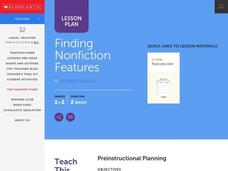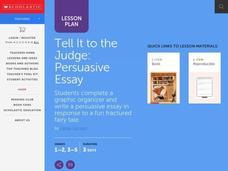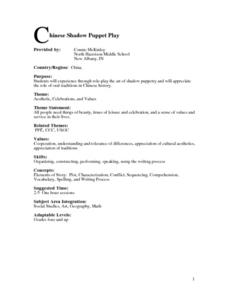Curated OER
Finding Nonfiction Features
Students review the differences between a fiction and non-fiction book. In groups, they use different non-fiction books to identify the eleven features that distinguish it from a fiction book. To end the lesson, they create a chart...
Curated OER
Tell It to the Judge - Persuasive Essay
Students compare and contrast a classic fairy tale with a fractured one and complete a graphic organizer. Then they write a persuasive essay following the steps of the writing process. Finally, students publish their completed essay and...
Curated OER
Esperanza Rising: Lesson 8
Sixth graders complete activities with the book Esperanza Rising by Pam Munoz Ryan. In this literature lesson, 6th graders read Chapter 8 of the book and discuss the chapter. They practice putting events in sequence and record new...
Curated OER
Comparing African, American, and European Folktales
Students find compare an African, Native American, and European folktale. In this folktale lesson, students listen to three different folktales before finding the similarities and differences in them. They complete a worksheet of...
Curated OER
Behind the Movie Chicago
Students explore the genre of the musical film and its history. They draw conclusions on relationships between a stage musical and a musical film. They share the results of their research as a class.
Curated OER
Adjectives
Young scholars are encouraged to think about the adjectives they choose and to steer away from adjectives that have become meaningless through overuse, such as "nice" and "good." They then add meaning and interest to sentences.
Curated OER
Figurative Language in Poetry and Prose
Students examine the impact of sound devices in poetry. In this poetry instructional activity, students read the listed poems and identify uses of hyperbole, simile, metaphor, imagery, and personification. Students discuss how sound...
Curated OER
Chinese Shadow Puppet Play
Students experience through role-play the art of shadow puppetry and appreciate the role of oral traditions in Chinese history. They research the origins and history of puppetry as a part of a unit on China. They discover what Chinese...
Curated OER
Dear Abby: A Direct and Indirect Characterization Lesson Plan
Students practice identifying and creating examples of characterization based on comprehension. They assess direct and indirect characterization and use conflict in a plot to generate a piece of writing. Each student selects accurate...
Curated OER
Heritage: Legends, Fairy Tales and the Native Americans
Fourth graders read a Native American legend local to the Utah region and compare it to a traditional European fairy tale. They use a Venn diagram as a graphic organizer for the comparison.
Curated OER
Heritage: Legends, Fairy Tales and the Native Americans
Fourth graders compare and contrast a Native American legend with a fairy tale and share their ideas by creating a venn diagram.
Curated OER
Martin Luther King Internet Photo Timeline
Students create a photographic timeline of the events in the life of Martin Luther King Jr. Working in small groups, they use internet research to find photos documenting the major events of his life. Their photos are printed and glued...
Curated OER
Japanese Folktales
Students listen to examples of Japanese folktales and identify universal themes. Students construct a 'kamishibai' - a traditional Japanese storytelling prop - and dramatize a folktale through puppetry.
Curated OER
Folktale Unit: The Princess and the Golden Shoes
Students study variations of classic folktales while deciding why the tales were so popular many years ago. They write a letter to an author.
Other popular searches
- Compare Cinderella Stories
- Comparing Cinderella Stories
- Cajun Cinderella Stories
- Various Cinderella Stories
- Contrasting Cinderella Stories















